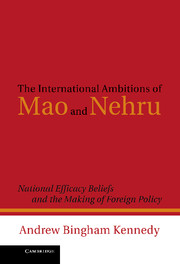 The International Ambitions of Mao and Nehru
The International Ambitions of Mao and Nehru 2 - National Efficacy Beliefs and Foreign Policy
Published online by Cambridge University Press: 05 January 2012
Summary
It is popular in the study of international relations to assume that individual leaders possess little agency in the face of international constraints. Like many assumptions, this one is an obvious oversimplification, but it can be useful and often seems justified. Nonetheless, assuming away the agency of leaders leaves us poorly positioned to understand why they sometimes do choose to go against the grain of the international system. Or, as Richard Samuels has succinctly put it, “[W]e know too much about constraints and not enough about choices.” To redress this gap, this chapter assumes that political elites do possess some freedom to choose in foreign policy and develops a theoretical framework to explain how they perceive and relate to systemic constraints.
More specifically, the focus here is on two basic ways in which leaders try to improve their state's position despite unpropitious international circumstances. When I use words like “ambitious” and “bold,” or “restrained” and “conservative,” in the pages that follow, I am referring to whether or not leaders are engaging in these kinds of behaviors. First, leaders may defy the distribution of power by challenging stronger states or coalitions on the battlefield. Such behavior, although not the norm, is hardly a rarity. In fact, states have launched wars against significantly stronger adversaries at least 11 times since World War II alone. When successful, these challenges can alter material balances or geographical advantages, sometimes only incrementally but sometimes more dramatically.
- Type
- Chapter
- Information
- The International Ambitions of Mao and NehruNational Efficacy Beliefs and the Making of Foreign Policy, pp. 10 - 40Publisher: Cambridge University PressPrint publication year: 2011


